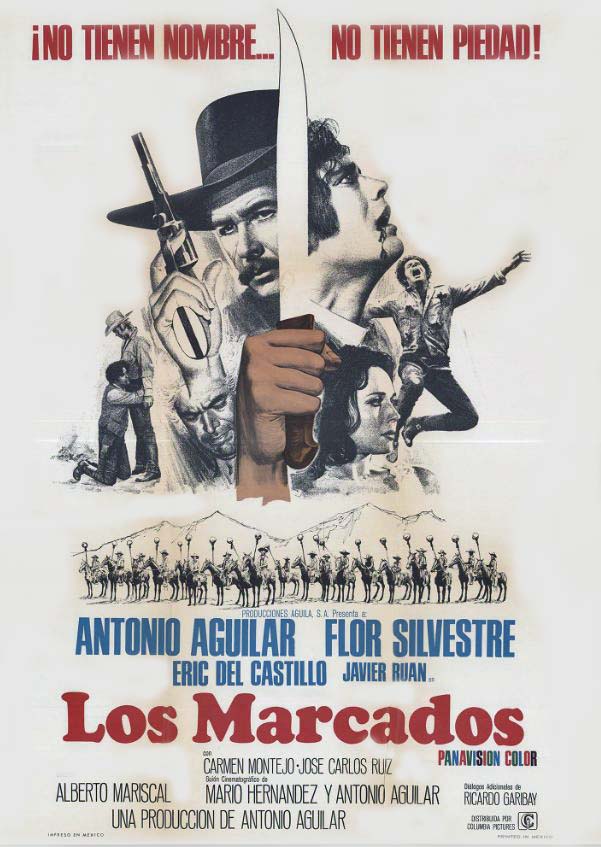Los marcados: Difference between revisions
| (22 intermediate revisions by the same user not shown) | |||
| Line 22: | Line 22: | ||
===<i class="fas fa-paragraph fa-xs"></i> Synopsis === | ===<i class="fas fa-paragraph fa-xs"></i> Synopsis === | ||
A corrupt | A corrupt town in the West is terrorized by „El Pardo“ (The Brown), a sadistic brute, and his stepson „El Niño“ (The Child), a madman with an angelic face who loves blood and recites Shakespeare in front of their gang of looters and rapists, occasionally sharing his stepfather's bed. Mercedes, owner of the local brothel, is the former lover of El Pardo and El Niño's mother. She's consumed by alcohol and lives in bitter memories of her life with the bandit. To exterminate the gang, which is hampering local commerce, members of the town hire a taciturn gunslinger dressed in black, „El Marcado“ (The Marked), who wears a huge scar on his face. He is aided by a crippled gunman known as „El Manco“ (The One-Armed). | ||
===<i class="fas fa-user-tag fa-xs"></i> Credits === | ===<i class="fas fa-user-tag fa-xs"></i> Credits === | ||
| Line 28: | Line 28: | ||
*'''Screenplay:''' [[:Category:Antonio Aguilar|Antonio Aguilar]], Ricardo Garibay, Mario Hernández | *'''Screenplay:''' [[:Category:Antonio Aguilar|Antonio Aguilar]], Ricardo Garibay, Mario Hernández | ||
*'''Cinematography:''' Rosalío Solano | *'''Cinematography:''' Rosalío Solano | ||
*'''Music:''' | *'''Music:''' [[:Category:Paul Sawtell|Paul Sawtell]] & [[:Category:Bert Shefter|Bert Shefter]], '''Musical Supervisor:''' [[:Category:Raúl Lavista|Raúl Lavista]] | ||
*'''Song:''' "Amargo Y Cruel Destino" sung by [[:Category:Antonio Aguilar|Antonio Aguilar]] | *'''Song:''' "Amargo Y Cruel Destino" sung by [[:Category:Antonio Aguilar|Antonio Aguilar]] | ||
*'''Producers''': [[:Category:Antonio Aguilar|Antonio Aguilar]], José R. Aguilar | *'''Producers''': [[:Category:Antonio Aguilar|Antonio Aguilar]], José R. Aguilar | ||
| Line 36: | Line 36: | ||
===<i class="fas fa-lightbulb fa-xs"></i> Trivia === | ===<i class="fas fa-lightbulb fa-xs"></i> Trivia === | ||
The film gets compared to ''El Topo'' for his black-clad hero and surreal situations, Peckinpah for | The film gets compared to ''El Topo'' for his black-clad hero and surreal situations, Peckinpah for scenes of extensive violence, and ''Django Kill... If You Live, Shoot!'' for hints of homosexuality among the baddies. | ||
Lead actor José Pascual Antonio Aguilar Márquez Barraza (1919–2007) also produced and co-wrote the film, and sings the title song. He was a Mexican singer, actor, songwriter, equestrian, film producer, and screenwriter with a dominating career in music. He recorded over 150 albums, which sold 25 million copies, and acted in more than 120 films. | Lead actor José Pascual Antonio Aguilar Márquez Barraza (1919–2007) also produced and co-wrote the film, and sings the title song. He was a Mexican singer, actor, songwriter, equestrian, film producer, and screenwriter with a dominating career in music. He recorded over 150 albums, which sold 25 million copies, and acted in more than 120 films. | ||
===<i class="fas fa-stopwatch fa-xs"></i> Versions and runtimes=== | ===<i class="fas fa-stopwatch fa-xs"></i> Versions and runtimes=== | ||
Runtime: 85 min | |||
===<i class="far fa-calendar-alt fa-xs"></i> Release Dates=== | ===<i class="far fa-calendar-alt fa-xs"></i> Release Dates=== | ||
December 25, 1971 (Mexico) | |||
===<i class="fa fa-map fa-xs"></i> Filming locations=== | ===<i class="fa fa-map fa-xs"></i> Filming locations=== | ||
[https://en.wikipedia.org/wiki/La_Quemada La Quemada], a Mexican archaeological site dating from the Caxcan Indians, is used in the film as a hideout for the bad guys. | |||
===<i class="fas fa-link fa-xs"></i> External Links === | ===<i class="fas fa-link fa-xs"></i> External Links === | ||
Latest revision as of 18:47, 30 December 2023
Los marcados (Mexico, 1971) Director: Alberto Mariscal
Also known as
They Call Him Marcado (USA)
-
 DVD
DVD - Soundtrack
- Pictures
- VHS
- Forum Topic
- Opinions and comments
- Not in a list
Synopsis
A corrupt town in the West is terrorized by „El Pardo“ (The Brown), a sadistic brute, and his stepson „El Niño“ (The Child), a madman with an angelic face who loves blood and recites Shakespeare in front of their gang of looters and rapists, occasionally sharing his stepfather's bed. Mercedes, owner of the local brothel, is the former lover of El Pardo and El Niño's mother. She's consumed by alcohol and lives in bitter memories of her life with the bandit. To exterminate the gang, which is hampering local commerce, members of the town hire a taciturn gunslinger dressed in black, „El Marcado“ (The Marked), who wears a huge scar on his face. He is aided by a crippled gunman known as „El Manco“ (The One-Armed).
Credits
- Cast: Antonio Aguilar (El Marcado), Flor Silvestre (Mercedes), Erik del Castillo (El Pardo), Javier Ruán (El Niño), José Carlos Ruiz (El Manco),Carmen Montejo, Javier Mark, Salvador Aguilar, Gabriel Retes, Hernando Name, Ignacio Magaloni, Mario Casillas, Cuco Pelucho, Manolo Cárdenas, Jorge Bekris, Mary Arden, Jorge Arvizu, Sergio Ramos, Marta Zamora, Hortensia Santoveña, Rosa Furman, Ricardo Fuentes, Dolores Beristáin
- Screenplay: Antonio Aguilar, Ricardo Garibay, Mario Hernández
- Cinematography: Rosalío Solano
- Music: Paul Sawtell & Bert Shefter, Musical Supervisor: Raúl Lavista
- Song: "Amargo Y Cruel Destino" sung by Antonio Aguilar
- Producers: Antonio Aguilar, José R. Aguilar
Reviews
We have no reviews of this film.
Trivia
The film gets compared to El Topo for his black-clad hero and surreal situations, Peckinpah for scenes of extensive violence, and Django Kill... If You Live, Shoot! for hints of homosexuality among the baddies.
Lead actor José Pascual Antonio Aguilar Márquez Barraza (1919–2007) also produced and co-wrote the film, and sings the title song. He was a Mexican singer, actor, songwriter, equestrian, film producer, and screenwriter with a dominating career in music. He recorded over 150 albums, which sold 25 million copies, and acted in more than 120 films.
Versions and runtimes
Runtime: 85 min
Release Dates
December 25, 1971 (Mexico)
Filming locations
La Quemada, a Mexican archaeological site dating from the Caxcan Indians, is used in the film as a hideout for the bad guys.
External Links
None.



